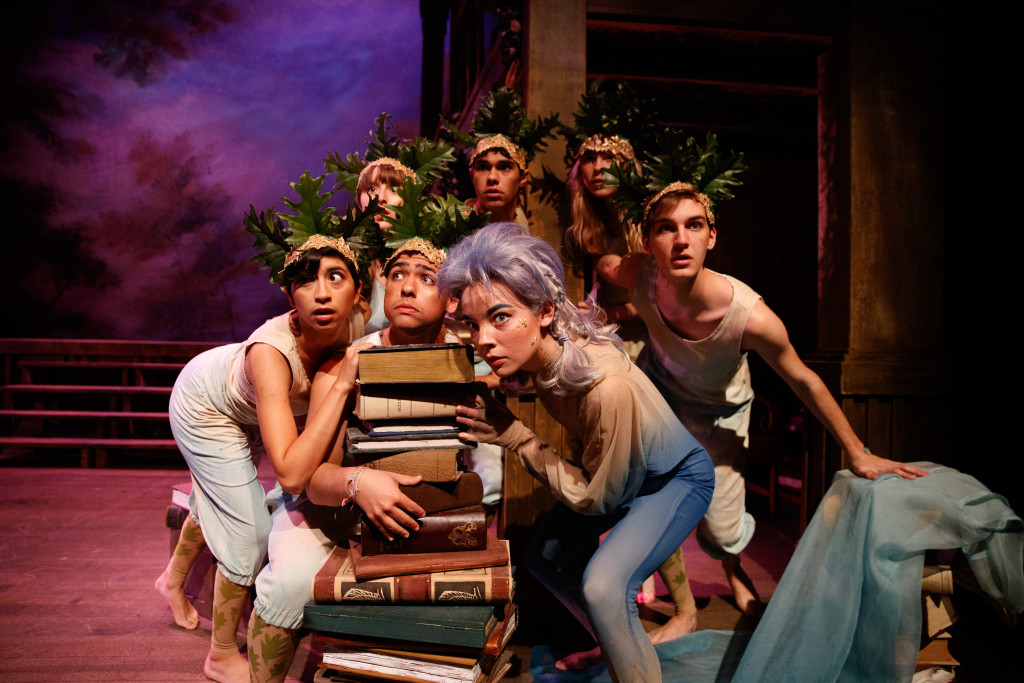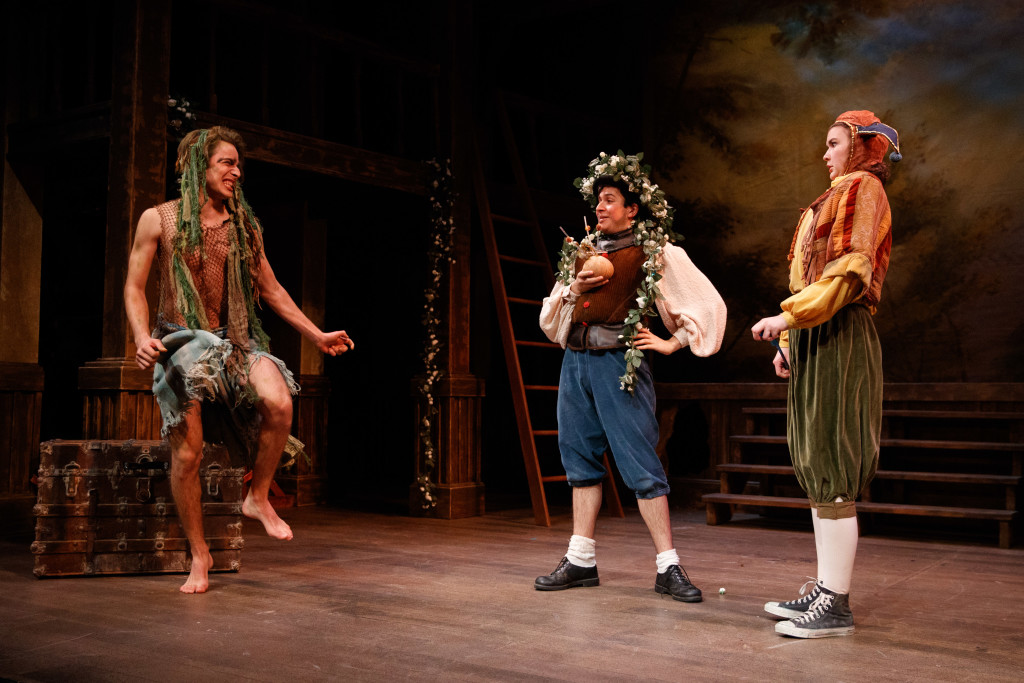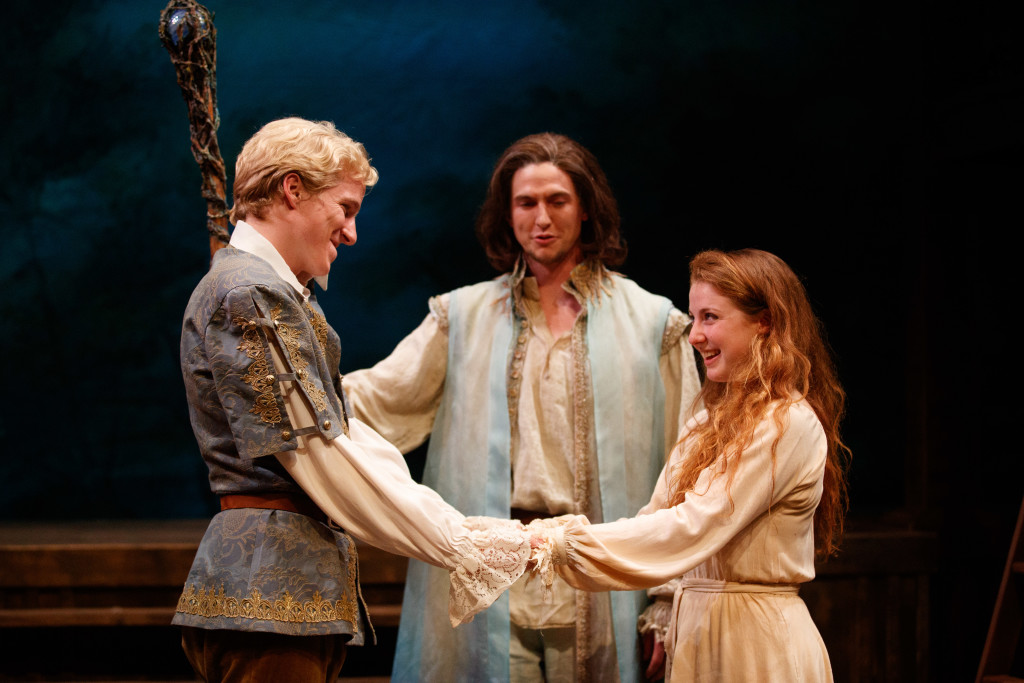
The TAPS department’s production of Shakespeare’s The Tempest opened last Thursday evening to a packed house. The moment the lights dimmed, thunder and lightning immediately cracked and frantic ship members emerged on all levels of the set, jolting in synchronous movements to depict the ship’s swaying. Flashing lights interjected the wash of blue lighting and throughout all of this, in the far left corner of the balcony, a lone woman delivered a haunting, soprano wail.
From the clamor of the storm at sea to the exotic forestry of the island, The Tempest proved to be a very tight production: every scene was heightened by the thoughtful execution of the set, sound, lighting, and costume designs.
These elements vividly brought to life Shakespeare’s story which centers around the magician Prospero (Tim Schurz, M.S. ‘17). Certain subplots and scenes felt slightly tired, such as those filled with Trinculo’s (Fiona Maguire, ‘19) drunken jokes that were too effortful to seem actually drunk, or the unvaried, non-mysterious internal conflict of the Nobles. However, one ought to consider the difficulty of delivering a Shakespeare comedy evenly when he archetypically demands the intertwining of so many disparate subplots. Otherwise, certain strands of this large story stood out and beefed up the overall product due to the compelling, riveting performances by the actors.
The subplot that arches over the story is that of Ariel (Lea Zawada, ‘18), the spirit under Prospero’s power. At all moments, Zawada’s portrayal of Ariel is committed — she is either galloping on her tiptoes and wide-eyed, full of wild energy, or low-lying and patient in the background, spying intently. Zawada is so in command of her character that it is almost puzzling when Prospero in the final scene sets her free, for it seemed as if she already were.
Ariel’s powerful presence should also be accredited to the island nymphs and their direction. In one stunning moment, at the end of the first act, we see the nymphs under Ariel’s lead move like herring fish in a single, flowing, unit. Dressed in subtle blue-white ombre and crowned with flowers, they appear as tendrils of a single force under Ariel. They continued a silent and beautiful support throughout the play.

The other character chained under Prospero’s authority is Caliban (Hamzeh Daoud, ‘20), the monster and son of a witch. Daoud’s depiction of Caliban is frightening and feral: he wears only a loincloth, skin smeared with greens and browns, and dons streaming, unkempt locks. His posture is bent over with the wear of someone who lives under nature’s beating. Always quivering with violent energy and growling gutturally in his speech, Daoud alarms the audience with this convincing portrayal of a gross reject.
Despite his alarming presence, Caliban is also a sympathetic character, given his enslavement and hermitage. When he, Prospero, and Prospero’s daughter Miranda (Emma Rothenberg, ‘19) collide, he reminds the audience that even a monster deserves empathy. He does so in a way that does not pander cheaply for pity nor does he completely shift from his vicious energy. Rather, he adds slight distress and fear in his tone and in his body language when he submits to his master, delivering a more complex image of the overall character. The noteworthy performances of Ariel and Caliban drew attention to the humanity of even those who are subhuman.
In the collision with Caliban, Miranda sharply turns her tone to demand authority. Observing the manifestation of Miranda and Caliban’s power dynamic is compelling because Miranda, along with her lover Ferdinand (Miles Petrie, ‘19), is otherwise one of the most delightful presences to observe. The plot between Miranda and Ferdinand is not particularly nuanced in and of itself: they meet, are immediately enraptured, and Prospero requires some amusing obstacles from Ferdinand before inevitably marrying the two. However, Miranda and Ferdinand’s palpable chemistry in their performance is so captivating that the scenes in between theirs seemed to be in anticipation for their reappearance. It should be noted that Rothenberg conveys the most impressive control of tone in her delivery, accelerating from full-voiced proclamations to soft and innocent titters in seconds. Petrie’s use of physical comedy, when he is under Prospero’s spell or laboring for his love, is well-timed and entertaining.

Schurz’s depiction of a stoic, majestic Duke and magician was consistent and fair, but I wished it reflected more dramatically the emotional multifacetedness of his character: of Prospero the father, the master over subhumans, and the absolving, power-less figure at the end.
I did not leave The Tempest focusing on larger, thematic questions, besides the subjugation of Ariel and Caliban and the humanity of these subhumans. But I did leave highly impressed with the strength with which certain performances were tackled and overall very pleased with the production quality and direction. Director Amy Freed had a vision to evoke Shakespeare’s world of magicians and monsters and it was executed precisely.
Images courtesy of Frank Chen
